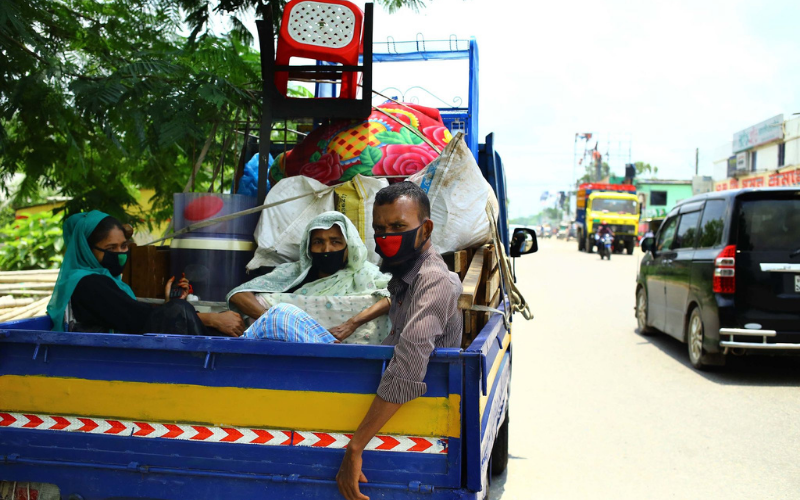
Consumption of rice, the staple food of Bangladeshis, decreased in Dhaka keeping pace with an exodus of people from the capital to elsewhere for losing jobs, fall in business, and closure of academic institutions after the Covid-19 pandemic began.
Wholesalers and retailers of rice at places in Dhaka told The Business Post that their sales dropped to almost half compared to pre-pandemic days.
In an attempt to thwart the spread of the viral pandemic, the government enforced several restrictions throughout 2020 and imposed a nationwide lockdown from April 5 as the second wave of infection began.
Sudden fall in income forced 78 per cent of households in Bangladesh to reduce expenditure and 52 per cent households to change dietary pattern involuntarily to cope with the impact of the Covid-19 pandemic, found a study on “Income and Employment in COVID Times: How the People are Coping– Findings from a Household Survey” by the Centre for Policy Dialogue.
The survey was carried out on 2,600 households between the last week of January and the first week of February 2021.
The pandemic pushed 24.5 million people under the title ‘new poor’ as the national estimate stood at 14.75 per cent in March 2021 though there was some recovery between June 2020 and March 2021.
Bangladesh Rich Merchants Association vice-president Haji Md Afsar said that there was a decline in sales of rice in Dhaka but it was not that bad.
“Sales of rice in Dhaka declined compared to pre-pandemic period as many people left Dhaka because of losing jobs and their income fell all of a sudden,” he said.
AKM Zaynal Abedin, a member of the association, agreed with the wholesalers.
“The pandemic left an impact on all types of businesses and same is the case for rice,” he said.
Ashiqur Rahman, a rice wholesaler at Mohammadpur Krishi Market, used to sell 3,000 sacks of rice every day before the pandemic began. Now his sales hover around 1,300 sacks of rice a day.
Ashiqur, the owner of Arab Rice Agency, collects rice from Kushtia, Naogaon, Sherpur, Jamalpur, Mymensingh and Chapainawabganj.
“Closure of schools, colleges and universities for such a long time forced many families to leave Dhaka which ultimately took a toll on rice consumption. Earnings of low-income group people faced a blow as the pandemic began and it cast a shadow on rice consumption,” he said.
At least 10 wholesalers at different wholesale rice markets in Dhaka shared identical views on a drop in sales and a fall in demand.
A wholesaler for the past nine years, Ashiqur never experienced such a situation that makes him unhappy.
‘We have to sell rice to retailers on credit. It’s totally on mutual trust. Sometimes we fall in difficulties to realise the dues,’ he said.

A family leaves Dhaka with all their belongings after sudden fall of income after the pandemic began. — The Business Post Photo
As high as 27.3 per cent of urban slum dwellers migrated in the past one year after the pandemic began and of them, 10.9 per cent were from Dhaka, found a study of the Power and Participation Research Centre.
Net reverse migration from urban areas over one year was 9.8 per cent, it said.
Alongside quantity of sales, prices of rice also dropped by Tk 3 to 5 comparing to the prices of the previous month, said the sellers.
Paijam variety of rice is now being sold at Tk 42-46 at different markets at Mohammadpur, Mirpur-10 and Kachukhet. Miniket variety rice is sold for Tk 53-57 a kg, BR-28 for Tk 42-50, Chinigura for Tk 80-90, Nazirshail rich for Tk 60-70, Basmati for Tk 62-63, Kataribhog for Tk 56-57.
The coarse variety of non-boiled rice, better known as atap rice, is sold for Tk 43-44 and fine variety for Tk 45-46.
Mohammad Julhas Islam, a rice wholesaler at Mirpur-10, said he was passing idle moments as there were a few customers. “We often sell on credit and retailers owe me a handsome amount of money. Now, I am in uncertainty whether I would get my money back or not as a lot of retailers left Dhaka after the pandemic began without paying their dues,” he added.
Julhas said that it would be tough for him to stay in the wholesale business if he did not get the dues from the retailers.
Another wholesaler Mohammad Anwar Hossain, owner of M/S Tamjid and Brothers at Kachukhet, said that he used to supply 3,500 sacks of rice to retailers on a single day before the pandemic began and now it came down to 3,000 sacks.
Mohammad Nazrul Islam, owner of a M/S Subarna Rice Agency at Karwan Bazar, said business at his agency rebounded after relaxing restrictions but it was yet to return to normalcy.
“I used to sell 800 sacks of rice every day before the pandemic but now I sell 650 to 700 sacks. If there is no fresh lockdown, I hope my sales will return to normal as students and government employees would return to Dhaka,” said Nazrul.
He also attributed people’s fasting during Ramadan to a decrease in rice sales.
Chandan Saha, owner of Janani Rice Agency at Khilkhet, also echoed Nazrul. He lamented that he used to sell rice to retailers on credit and most of them left Dhaka without paying his dues that forced him to retail rice alongside wholesaling.
Md Sanaullah, a retailer at Mohakhali, said that he used to sell 30 to 35 kg of rice every day alongside other commodities but it went down to 20 to 25 kg after the pandemic began.
“Most of the customers at my shop are students as there are a number of student’s mess or privately run hostels in the area. I hope everything will be normal if the lockdown is not extended further,” said Sanaullah.
Dhaka’s population was 68 lakh in 1991, as per Bangladesh Bureau of Statistics data. The UN World Urbanization Prospects 2018 data showed that Dhaka's population surpassed 1.70 crore.